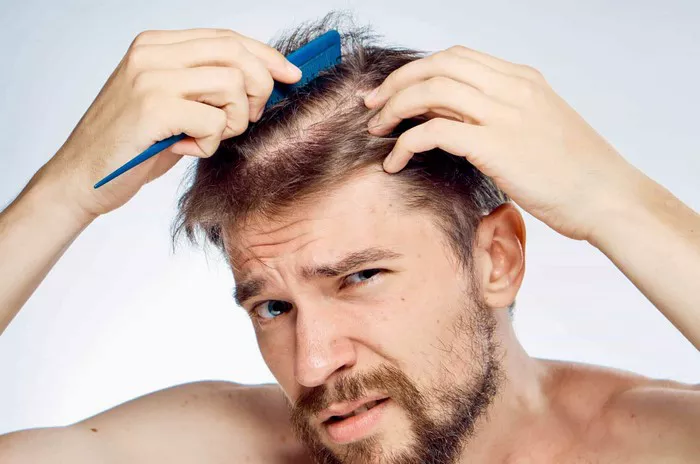Hair loss is a common concern for many individuals, and one potential underlying cause is thyroid disorders. Among the thyroid conditions, hypothyroidism, or underactive thyroid, is often associated with hair thinning and loss. Understanding the connection between hypothyroidism and hair loss is crucial for effective management. In this article, we will explore the relationship between thyroid disorders and hair health, along with strategies for managing and treating hypothyroidism.
I. Thyroid Disorders and Hair Loss: Unraveling the Connection
The thyroid gland plays a pivotal role in regulating various bodily functions, including metabolism. When the thyroid gland is underactive and doesn’t produce enough thyroid hormones, it can lead to hypothyroidism. One of the noticeable symptoms of hypothyroidism is hair loss. The thyroid hormones, particularly triiodothyronine (T3) and thyroxine (T4), influence the hair growth cycle. Disruptions in these hormones can disrupt the normal hair growth process, leading to thinning hair and hair loss.
II. Managing Hypothyroidism: Lifestyle Changes and Medications
Effectively managing hypothyroidism involves a combination of lifestyle changes and, in many cases, medication. Here are some key strategies:
Medication Adherence: Thyroid hormone replacement medications, such as levothyroxine, are commonly prescribed for hypothyroidism. Adhering to the prescribed medication regimen is crucial for maintaining optimal thyroid hormone levels in the body.
Balanced Diet: A well-balanced diet, rich in essential nutrients like iodine, selenium, and zinc, is important for supporting thyroid function. Consult with a healthcare professional or a registered dietitian to ensure your diet is thyroid-friendly.
Regular Exercise: Engaging in regular physical activity can help boost metabolism and contribute to overall well-being. It’s important to find a balance, as excessive exercise can potentially exacerbate thyroid issues.
Stress Management: Chronic stress can negatively impact thyroid function. Incorporating stress-reducing practices such as meditation, yoga, or deep breathing exercises can be beneficial.
III. Treating Hypothyroidism: Medical Interventions
In addition to lifestyle changes, medical interventions may be necessary for effectively treating hypothyroidism:
Adjusting Medication Dosage: Periodic monitoring of thyroid hormone levels through blood tests allows healthcare providers to adjust medication dosages as needed to maintain optimal thyroid function.
Combination Therapies: In some cases, combining T3 and T4 hormone replacement medications may be more effective than using T4 alone. This approach is tailored to individual needs and responses.
Thyroid Hormone Supplements: Supplements containing essential nutrients like iron and biotin may be recommended to support overall hair health and minimize hair loss.
Professional Hair Treatments: Some individuals may benefit from professional hair treatments, such as laser therapy or platelet-rich plasma (PRP) therapy, to stimulate hair growth. Consult with a healthcare professional to explore these options.
IV. FAQs on Hair Loss and Thyroid Disorders
Q1: Can hyperthyroidism (overactive thyroid) cause hair loss as well?
A1: Yes, although hypothyroidism is more commonly associated with hair loss, hyperthyroidism can also lead to hair thinning and shedding.
Q2: How long does it take for hair to grow back after hypothyroidism is treated?
A2: Hair regrowth varies among individuals. With effective hypothyroidism treatment, some may experience noticeable improvements in a few months, while others may take longer.
Q3: Are there specific hairstyles or hair care practices that can help manage hair loss in thyroid disorders?
A3: Choosing hairstyles that reduce tension on the hair and adopting gentle hair care practices, such as using a wide-toothed comb and avoiding excessive heat styling, can be beneficial.
Q4: Can hypothyroidism-related hair loss be permanent?
A4: In many cases, with proper hypothyroidism management, hair loss is reversible. However, individual responses may vary, and it’s essential to address underlying thyroid issues promptly.
Q5: Are there natural remedies for managing hypothyroidism and preventing hair loss?
A5: While lifestyle changes, including a balanced diet and stress management, can support thyroid health, it’s crucial to consult with a healthcare professional for appropriate medical interventions. Natural remedies alone may not be sufficient for managing hypothyroidism.
In conclusion, understanding the connection between hypothyroidism and hair loss is the first step towards effective management. By incorporating lifestyle changes, adhering to medication regimens, and exploring medical interventions when necessary, individuals can take proactive steps to address hypothyroidism and promote healthier hair. If you have concerns about hair loss or suspect thyroid issues, it’s essential to consult with a healthcare professional for a comprehensive evaluation and personalized treatment plan.

